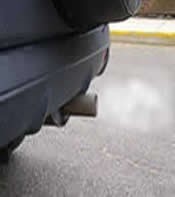DEP Encourages Residents to Take Steps to Improve New Jersey Air Quality
DEP ENCOURAGES RESIDENTS TO TAKE STEPS TO IMPROVE NEW JERSEY AIR QUALITY
(19/P043) TRENTON – The Department of Environmental Protection reminds individuals that making basic changes in their daily routines can improve air quality across New Jersey while also protecting public health and saving money.
 “Spring is the perfect time of year to review our daily routines and see what we can do to help improve the quality of the air we breathe,” DEP Commissioner Catherine R. McCabe said. “Everyone can do their part to take simple steps that will help reduce emissions and greenhouse gases and protect public health, like turning our cars off when we’re not driving.”
“Spring is the perfect time of year to review our daily routines and see what we can do to help improve the quality of the air we breathe,” DEP Commissioner Catherine R. McCabe said. “Everyone can do their part to take simple steps that will help reduce emissions and greenhouse gases and protect public health, like turning our cars off when we’re not driving.”
Some simple changes include combining automobile trips, eliminating car idling, keeping your car’s maintenance current, purchasing an energy-efficient vehicle, and checking the state’s Air Quality Index before heading outside.
New Jersey is a national leader in clean energy and controlling sources of air pollution in the state, resulting in significant progress in improved air quality, including:
Transportation is the largest source of ozone-forming pollutants in New Jersey and contributes nearly half of the greenhouse gas emissions in the state. Vehicles emit nitrogen oxides that react with other pollutants to create ozone.
Ground level ozone, or smog, is formed through a reaction involving warmer temperatures, sunshine and certain types of pollutants. The young, the elderly and those with respiratory conductions such as asthma are especially vulnerable to the effects of ozone.
 Greenhouse gases contribute to global warming, which causes more floods, droughts or intense storms, as well as more frequent and severe heat waves. The planet's oceans and glaciers have also experienced big changes – oceans are warming and becoming more acidic, ice caps are melting, and sea levels are rising.
Greenhouse gases contribute to global warming, which causes more floods, droughts or intense storms, as well as more frequent and severe heat waves. The planet's oceans and glaciers have also experienced big changes – oceans are warming and becoming more acidic, ice caps are melting, and sea levels are rising.
As warmer weather approaches the Garden State, residents are encouraged to take steps to reduce air pollutants include:
Everyone, especially those with health problems, is encouraged to check out DEP’s Air Monitoring Alert System, which uses color codes to plan daily activities around current air quality conditions. Conditions are updated daily on the DEP’s Air Monitoring Web site, www.njaqinow.net/. Overexertion on poorer air quality days can be harmful to your health.
Consider subscribing to EnviroFlash, an online alert system that delivers air quality information to your email inbox or cell phone. You can also see air quality forecasts on Twitter and through RSS feeds through the federal Environmental Protection Agency’s EnviroFlash system. Visit www.enviroflash.info.
For all of New Jersey’s air quality facts visit www.cleanair.nj.gov.
Like the DEP Division of Air Quality, Energy and Sustainability on Facebook at www.facebook.com/NJDEPAQES/.
Follow the DEP on Twitter @NewJerseyDEP.
###
Legal Disclaimer:
EIN Presswire provides this news content "as is" without warranty of any kind. We do not accept any responsibility or liability for the accuracy, content, images, videos, licenses, completeness, legality, or reliability of the information contained in this article. If you have any complaints or copyright issues related to this article, kindly contact the author above.
